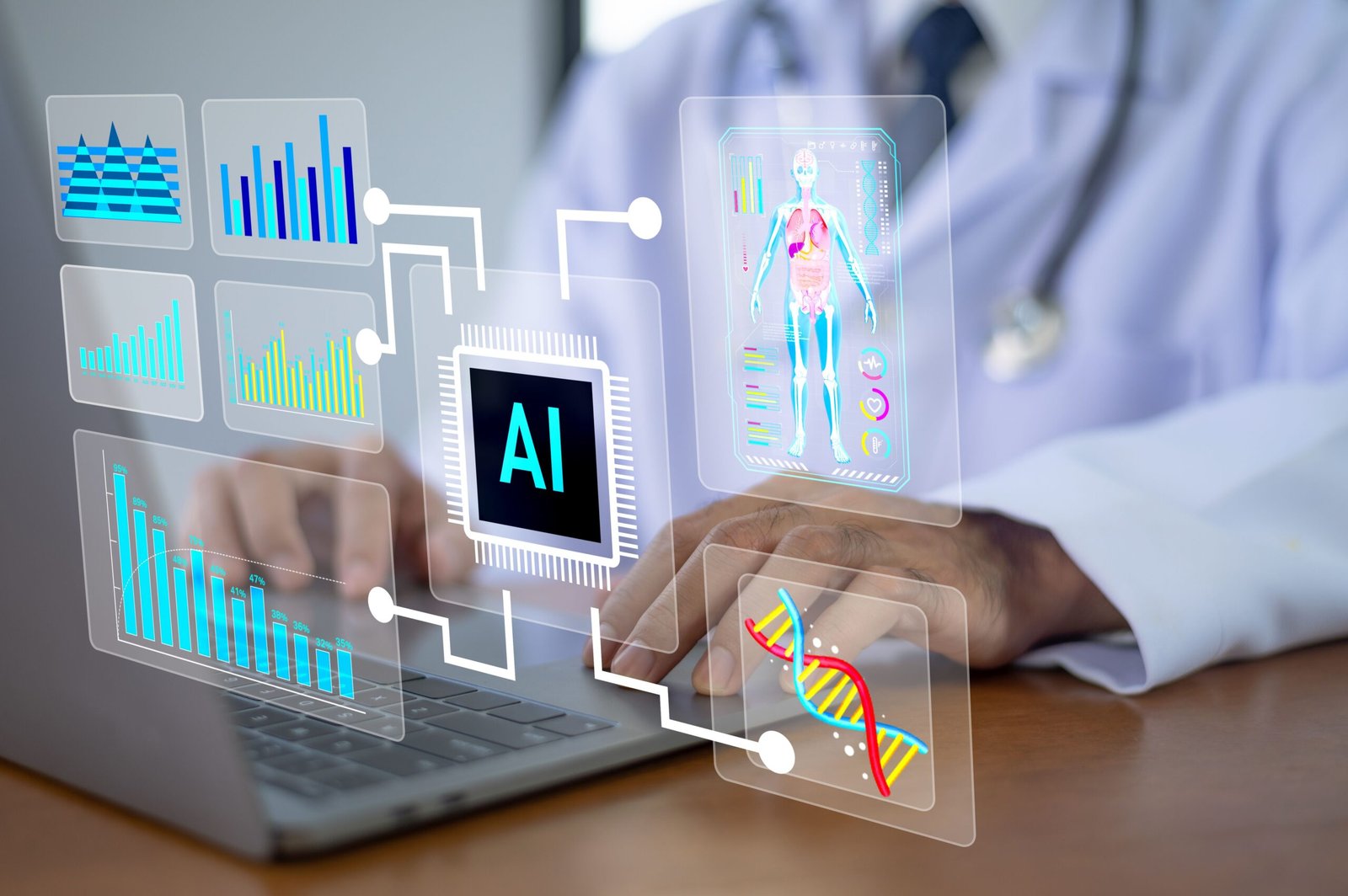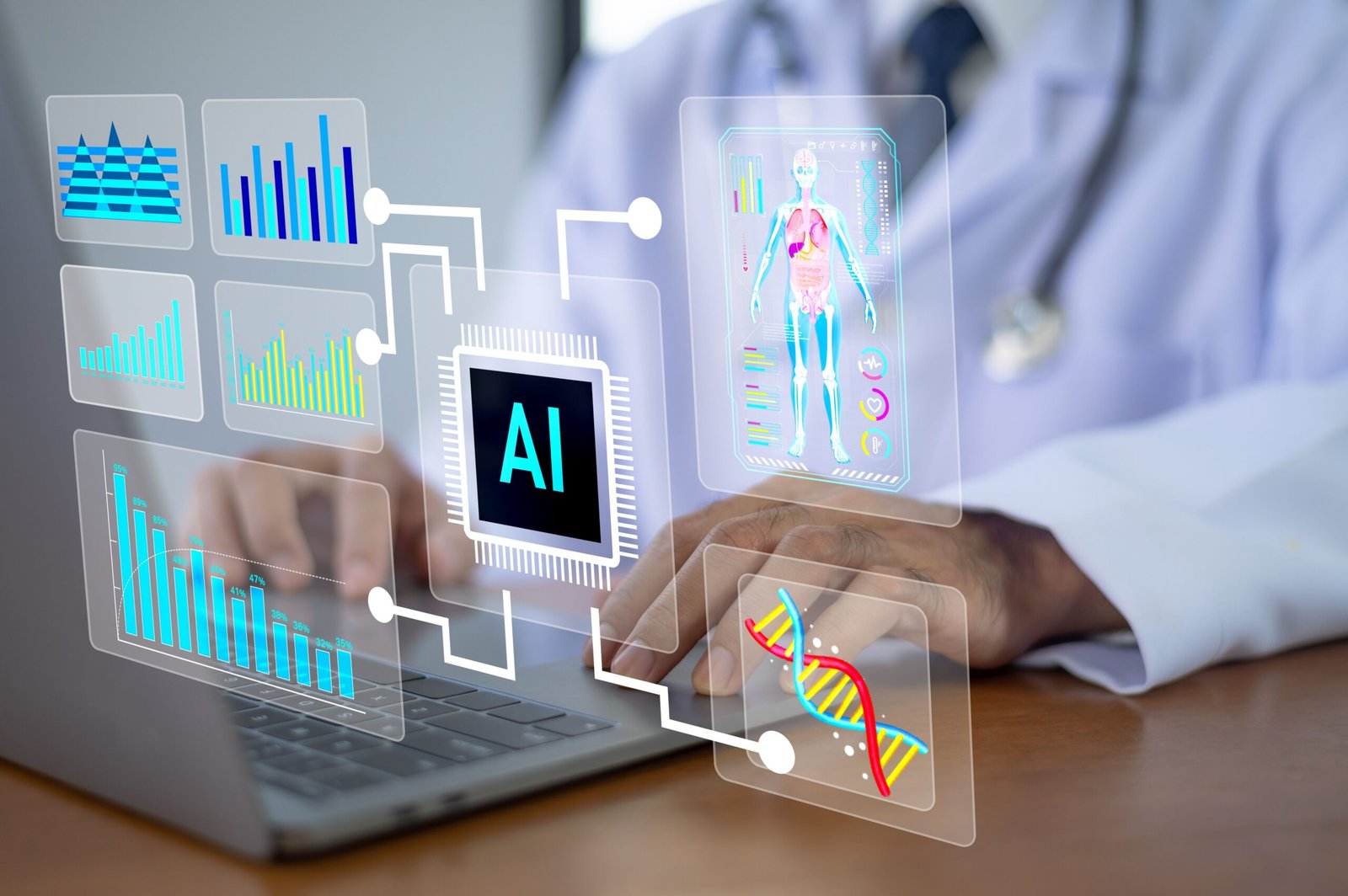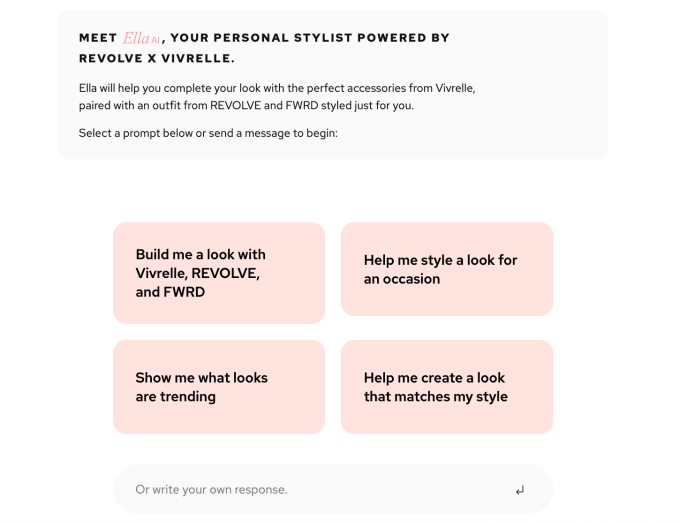Tools & Platforms
OpenAI claims new GPT-5 model boosts ChatGPT to ‘PhD level’

North America Technology correspondent
Technology reporter
 Getty Images
Getty ImagesChatGPT-maker OpenAI has unveiled the long-awaited latest version of its artificial intelligence (AI) chatbot, GPT-5, saying it can provide PhD-level expertise.
Billed as “smarter, faster, and more useful,” OpenAI co-founder and chief executive Sam Altman lauded the company’s new model as ushering in a new era of ChatGPT.
“I think having something like GPT-5 would be pretty much unimaginable at any previous time in human history,” he said ahead of Thursday’s launch.
GPT-5’s release and claims of its “PhD-level” abilities in areas such as coding and writing come as tech firms continue to compete to have the most advanced AI chatbot.
Elon Musk recently made similar claims of his own AI chatbot, Grok, which has been plugged into X (formerly Twitter).
During the launch of Grok’s latest iteration last month, Musk said it was “better than PhD level in everything” and called it the world’s “smartest AI”.
Meanwhile, Altman said OpenAI’s new model would suffer from fewer hallucinations – the phenomenon whereby large language models make up answers- and be less deceptive.
OpenAI is also pitching GPT-5 to coders as a proficient assistant, following a trend among major American AI developers, including Anthropic whose Claude Code targets the same market.
What can GPT-5 do?
OpenAI has highlighted GPT-5’s ability to create software in its entirety and demonstrate better reasoning capabilities – with answers that show workings, logic and inference.
The company claims it has been trained to be more honest, provide users with more accurate responses and says that, overall, it feels more human.
According to Altman, the model is “significantly better” than its predecessors.
“GPT-3 sort of felt to me like talking to a high school student… 4 felt like you’re kind of talking to a college student,” he said in a briefing ahead of Thursday’s launch.
“GPT-5 is the first time that it really feels like talking to an expert in any topic, like a PhD-level expert.”
For Prof Carissa Véliz of the Institute for Ethics in AI, however, GPT-5’s launch may not be as significant as its marketing may suggest.
“These systems, as impressive as they are, haven’t been able to be really profitable,” she said, also noting that they can only mimic – rather than truly emulate – human reasoning abilities.
“There is a fear that we need to keep up the hype, or else the bubble might burst, and so it might be that it’s mostly marketing.”
The BBC’s AI Correspondent Marc Cieslak gained exclusive access to GPT-5 before it’s official launch.
“Apart from minor cosmetic differences the experience was similar to using the older chatbot: give it tasks or ask it questions by typing a text prompt.
It’s now powered by what’s called a reasoning model which essentially means it thinks harder about solving problems, but this seems more like an evolution than revolution for the tech.”
The company will roll out the model to all users from Thursday.
In the coming days it will become a lot clearer whether it really is as good as Sam Altman claims it is.
Clash with other AI firm
Anthropic recently revoked OpenAI’s access to its application programming interface (API), claiming the company was violating its terms of service by using its coding tools ahead of GPT-5’s launch.
An OpenAI spokesperson said it was “industry standard” to evaluate other AI systems to assess their own progress and safety.
“While we respect Anthropic’s decision to cut off our API access, it’s disappointing considering our API remains available to them,” they added.
With a free tier for its new model, the company may be signalling a potential move away from the proprietary models that have previously dominated its offerings.
ChatGPT changes
On Monday, OpenAI revealed it was making changes to promote a healthier relationship between users and ChatGPT.
In a blog post, it said: “AI can feel more responsive and personal than prior technologies, especially for vulnerable individuals experiencing mental or emotional distress.”
It said it would not give a definitive answer to questions such as, “Should I break up with my boyfriend?”
Instead, it would “help you think it through – asking questions, weighing pros and cons”, according to the blog post.
In May, OpenAI pulled a heavily-criticised update which made ChatGPT “overly flattering”, according to Sam Altman.
On a recent episode of OpenAI’s own podcast, Mr Altman said he was thinking about how people interact with his products.
“This is not all going to be good, there will still be problems,” he said.
“People will develop these somewhat problematic, or maybe very problematic, parasocial relationships [with AI]. Society will have to figure out new guardrails. But the upsides will be tremendous.”
Mr Altman is known to be a fan of the 2013 film Her, where a man develops a relationship with an AI companion.
In 2024, actress Scarlett Johansson, who voiced the AI companion in the film, said she was left “shocked” and “angered” after OpenAI launched a chatbot with an “eerily similar” voice to her own.

Tools & Platforms
Pistoia Alliance Announces Agentic AI Collaboration Initiative

Doctor technology AI integrates big data analytics with clinical research, enabling precise treatment plans tailored to individual patient needs and genetic profiles. | Image Credit: © Suriyo – stock.adobe.com
At the European conference of the Pistoia Alliance, a global nonprofit, early in 2025, a theme emerged: that agentic artificial intelligence (AI) is viewed by life sciences professionals as potentially being among the most disruptive emerging technologies over the next two to three years (1). Agentic AI has the potential, according to the Pistoia Alliance, to accelerate multi-step processes, such as target prioritization and compound optimization, by joining together reasoning, tool use, and execution.
However, the Pistoia Alliance said in a Sept. 4, 2025 press release that surrendering full autonomy to AI creates a sort of “black box” that may undermine trust, capacity for reproducibility, and regulatory compliance (1). It is for those reasons—with the overarching mission of safely adopting agentic AI—that the nonprofit is establishing a new initiative bringing together experts from the pharmaceutical, technology, and biotech industries to help shape certain standards and protocols under which AI agents will be allowed to perform.
How will the initiative encourage responsible AI use?
With Genentech providing the initial seed funding for the project, the Pistoia Alliance said it is currently seeking both additional partners and funds (1). The nonprofit has stated strategic priorities to harness AI and expedite R&D and is calling upon an AI and machine learning (ML) community of experts to continue building support for the industry-wide responsible adoption of AI.
“Our members see agentic AI as one of the most impactful technologies set to change how they work and innovate, but they also recognize the risks if adoption happens without the right guardrails,” said Becky Upton, PhD, president of the Pistoia Alliance, in the press release (1). “The Alliance is uniquely positioned to lead this work, drawing on more than eight years’ experience in pre-competitive collaboration around AI, from benchmarking frameworks for large language models to a pharmacovigilance community focused on responsible AI deployment. We know that more expert minds focused on the same topic will advance the safe and successful use of AI technologies.”
What are priorities for the industry?
As part of a recent webinar, the Pistoia Alliance said it polled more than 100 pharma professionals, and the consensus top priority for pre-competitive collaboration was the creation of shared validation frameworks and metrics, for model robustness and bias (1). Shared frameworks urgently need to be established, according to the Pistoia Alliance, for the safe adoption of AI because when evidence must be validated, auditable agent workflows that are shaped by subject matter experts and reputable data sources are necessary for the production of reliable results.
“This initiative will address the common issues we all face in integrating AI developments into a cohesive ecosystem that improves output quality,” said Robert Gill, the Agentic AI program lead at the Pistoia Alliance, in the press release (1). “It will enable members to link standalone AI applications into a dynamic network and build workflows where multiple agents can reason, plan and act together. By becoming sponsors, organizations can act as first movers—shaping the standards, gaining early access to outputs, and ensuring they are at the forefront of the next wave of AI innovation in healthcare.”
Want to make your voice heard?
Pharmaceutical Technology® Group is asking its audience within the bio/pharmaceutical industry to share their experiences in a survey that seeks perspectives on new and rapidly evolving technologies as automation, advanced analytics, digital twins, and AI (2). The survey can be accessed directly at this link.
References
1. Pistoia Alliance. Pistoia Alliance Unveils Agentic AI Initiative and Seeks Industry Funding to Drive Safe Adoption. Press Release. Sept. 4, 2025.
2. Cole, C. Digital Transformation in Pharma Manufacturing: Industry Perspectives Survey. PharmTech.com, Aug. 27, 2025.
Tools & Platforms
Pistoia Alliance Announces Agentic AI Collaboration Initiative

Doctor technology AI integrates big data analytics with clinical research, enabling precise treatment plans tailored to individual patient needs and genetic profiles. | Image Credit: © Suriyo – stock.adobe.com
At the European conference of the Pistoia Alliance, a global nonprofit, early in 2025, a theme emerged: that agentic artificial intelligence (AI) is viewed by life sciences professionals as potentially being among the most disruptive emerging technologies over the next two to three years (1). Agentic AI has the potential, according to the Pistoia Alliance, to accelerate multi-step processes, such as target prioritization and compound optimization, by joining together reasoning, tool use, and execution.
However, the Pistoia Alliance said in a Sept. 4, 2025 press release that surrendering full autonomy to AI creates a sort of “black box” that may undermine trust, capacity for reproducibility, and regulatory compliance (1). It is for those reasons—with the overarching mission of safely adopting agentic AI—that the nonprofit is establishing a new initiative bringing together experts from the pharmaceutical, technology, and biotech industries to help shape certain standards and protocols under which AI agents will be allowed to perform.
How will the initiative encourage responsible AI use?
With Genentech providing the initial seed funding for the project, the Pistoia Alliance said it is currently seeking both additional partners and funds (1). The nonprofit has stated strategic priorities to harness AI and expedite R&D and is calling upon an AI and machine learning (ML) community of experts to continue building support for the industry-wide responsible adoption of AI.
“Our members see agentic AI as one of the most impactful technologies set to change how they work and innovate, but they also recognize the risks if adoption happens without the right guardrails,” said Becky Upton, PhD, president of the Pistoia Alliance, in the press release (1). “The Alliance is uniquely positioned to lead this work, drawing on more than eight years’ experience in pre-competitive collaboration around AI, from benchmarking frameworks for large language models to a pharmacovigilance community focused on responsible AI deployment. We know that more expert minds focused on the same topic will advance the safe and successful use of AI technologies.”
What are priorities for the industry?
As part of a recent webinar, the Pistoia Alliance said it polled more than 100 pharma professionals, and the consensus top priority for pre-competitive collaboration was the creation of shared validation frameworks and metrics, for model robustness and bias (1). Shared frameworks urgently need to be established, according to the Pistoia Alliance, for the safe adoption of AI because when evidence must be validated, auditable agent workflows that are shaped by subject matter experts and reputable data sources are necessary for the production of reliable results.
“This initiative will address the common issues we all face in integrating AI developments into a cohesive ecosystem that improves output quality,” said Robert Gill, the Agentic AI program lead at the Pistoia Alliance, in the press release (1). “It will enable members to link standalone AI applications into a dynamic network and build workflows where multiple agents can reason, plan and act together. By becoming sponsors, organizations can act as first movers—shaping the standards, gaining early access to outputs, and ensuring they are at the forefront of the next wave of AI innovation in healthcare.”
Want to make your voice heard?
Pharmaceutical Technology® Group is asking its audience within the bio/pharmaceutical industry to share their experiences in a survey that seeks perspectives on new and rapidly evolving technologies as automation, advanced analytics, digital twins, and AI (2). The survey can be accessed directly at this link.
References
1. Pistoia Alliance. Pistoia Alliance Unveils Agentic AI Initiative and Seeks Industry Funding to Drive Safe Adoption. Press Release. Sept. 4, 2025.
2. Cole, C. Digital Transformation in Pharma Manufacturing: Industry Perspectives Survey. PharmTech.com, Aug. 27, 2025.
Tools & Platforms
Fashion retailers partner to offer personalized AI styling tool ‘Ella’

The luxury membership platform Vivrelle, which allows customers to rent high-end goods, announced Thursday the launch of an AI personal styling tool called Ella as part of its partnership with fashion retailers Revolve and FWRD.
The launch is an example of how the fashion industry is leveraging AI technology to enhance customer experiences and is one of the first partnerships to see three retailers come together to offer a personalized AI experience. Revolve and FWRD let users shop designer clothing, while Revolve also has an option to shop pre-owned.
The tool, Ella, provides recommendations to customers across the three retailers on what to purchase or rent to make an outfit come to life. For example, users can ask for “a bachelorette weekend outfit,” or “what to pack for a trip,” and the technology will search across the Vivrelle, FWRD, and Revolve shopping platforms to create outfit suggestions. Users can then check out in one cart on Vivrelle.
In theory, the more one uses Ella, the better its suggestions become. It’s the fashion equivalent of asking ChatGPT what to wear in Miami for a girl’s weekend.
Blake Geffen, the CEO and co-founder of Vivrelle (which announced a $62 million Series C earlier this year), told TechCrunch that she hopes Ella can take the “stress out of packing for a vacation or everyday dressing.
“Ella has been in the works for quite some time,” she told TechCrunch, adding that it took about a year to build and release the product.
This is actually the second AI tool from the three companies. The Vivrelle, Revolve, and FWRD partnership earlier this year also launched Complete the Look, which offers last-minute fashion suggestions to complement what’s in a customer’s cart at checkout. Their latest tool, Ella, however, takes the fashion recommendation game to another level.
Techcrunch event
San Francisco
|
October 27-29, 2025
Fashion has been obsessed with trying to make personalized shopping happen for decades now. Even the 90s movie “Clueless” showed Cher picking outfits from her digitized wardrobe.
This current AI boom has led to rapid innovation and democratized access to AI technology, allowing many fashion companies to launch personalized AI fashion companies and raise millions while doing so.
“With Ella, we’re giving our members as much flexibility and options as possible to shop or borrow with ease, through seamless conversations that allow you to share as little or as much as you want, just like talking to a live stylist,” Geffen said. “We’re excited to be the first brand to integrate rental, resale, and retail into one streamlined omnichannel experience.”
-

 Business6 days ago
Business6 days agoThe Guardian view on Trump and the Fed: independence is no substitute for accountability | Editorial
-
Tools & Platforms3 weeks ago
Building Trust in Military AI Starts with Opening the Black Box – War on the Rocks
-

 Ethics & Policy1 month ago
Ethics & Policy1 month agoSDAIA Supports Saudi Arabia’s Leadership in Shaping Global AI Ethics, Policy, and Research – وكالة الأنباء السعودية
-

 Events & Conferences4 months ago
Events & Conferences4 months agoJourney to 1000 models: Scaling Instagram’s recommendation system
-

 Jobs & Careers2 months ago
Jobs & Careers2 months agoMumbai-based Perplexity Alternative Has 60k+ Users Without Funding
-

 Education2 months ago
Education2 months agoVEX Robotics launches AI-powered classroom robotics system
-

 Funding & Business2 months ago
Funding & Business2 months agoKayak and Expedia race to build AI travel agents that turn social posts into itineraries
-

 Podcasts & Talks2 months ago
Podcasts & Talks2 months agoHappy 4th of July! 🎆 Made with Veo 3 in Gemini
-

 Podcasts & Talks2 months ago
Podcasts & Talks2 months agoOpenAI 🤝 @teamganassi
-

 Education2 months ago
Education2 months agoMacron says UK and France have duty to tackle illegal migration ‘with humanity, solidarity and firmness’ – UK politics live | Politics


